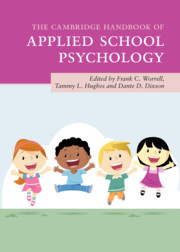Book contents
- The Cambridge Handbook of Applied School Psychology
- The Cambridge Handbook of Applied School Psychology
- Copyright page
- Contents
- Contributors
- Contributor Biographies
- Acknowledgments
- 1 Broadening the Focus of School Psychology Practice
- Part I Individual-Level Academic Interventions
- 2 Enhancing Reading Motivation in Schools
- 3 Addressing “Won’t Do” Issues in Mathematics
- 4 Learning Disabilities in Mathematics
- 5 Executive Function and School Performance
- Part II Teacher- and System-Level Interventions
- Part III Interventions from Educational and Social/Personality Psychology
- Part IV Behavioral and Social-Emotional Interventions
- Part V Health and Pediatric Interventions
- Part VI Family Connections and Life Transitions
- Part VII Special Populations
- Part VIII Conclusion
- Index
- References
4 - Learning Disabilities in Mathematics
from Part I - Individual-Level Academic Interventions
Published online by Cambridge University Press: 18 September 2020
- The Cambridge Handbook of Applied School Psychology
- The Cambridge Handbook of Applied School Psychology
- Copyright page
- Contents
- Contributors
- Contributor Biographies
- Acknowledgments
- 1 Broadening the Focus of School Psychology Practice
- Part I Individual-Level Academic Interventions
- 2 Enhancing Reading Motivation in Schools
- 3 Addressing “Won’t Do” Issues in Mathematics
- 4 Learning Disabilities in Mathematics
- 5 Executive Function and School Performance
- Part II Teacher- and System-Level Interventions
- Part III Interventions from Educational and Social/Personality Psychology
- Part IV Behavioral and Social-Emotional Interventions
- Part V Health and Pediatric Interventions
- Part VI Family Connections and Life Transitions
- Part VII Special Populations
- Part VIII Conclusion
- Index
- References
Summary
Research in the field of mathematical learning disability (MLD) is growing. Though a proportion of children in every school appear to struggle with mathematical achievement, MLD characterizes a subgroup of students with poor achievement and skill deficits that differentiate them from their low-achieving peers. This chapter explores some of the characteristics of children with MLD, including underachievement in mathematics, poor number sense, limited working memory, and additional processing deficits. Emerging evidence for universal screening, prevention, and early intervention are also presented. The chapter ends with guidelines for school psychologists to apply the extant literature to their own practice, along with a list of resources to gain further expertise on the typical and atypical development of numerical cognition.
Keywords
- Type
- Chapter
- Information
- The Cambridge Handbook of Applied School Psychology , pp. 48 - 63Publisher: Cambridge University PressPrint publication year: 2020

